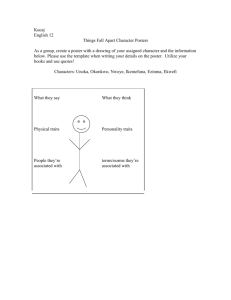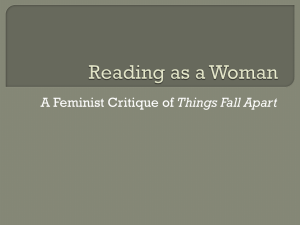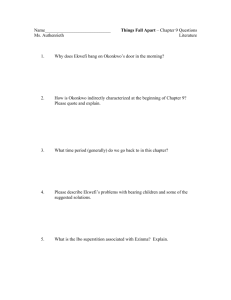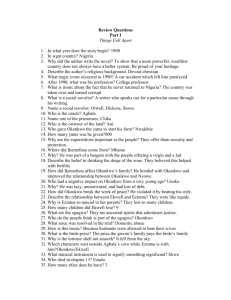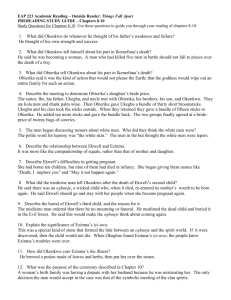TFA Journal Entry #4 Ch. 9
advertisement
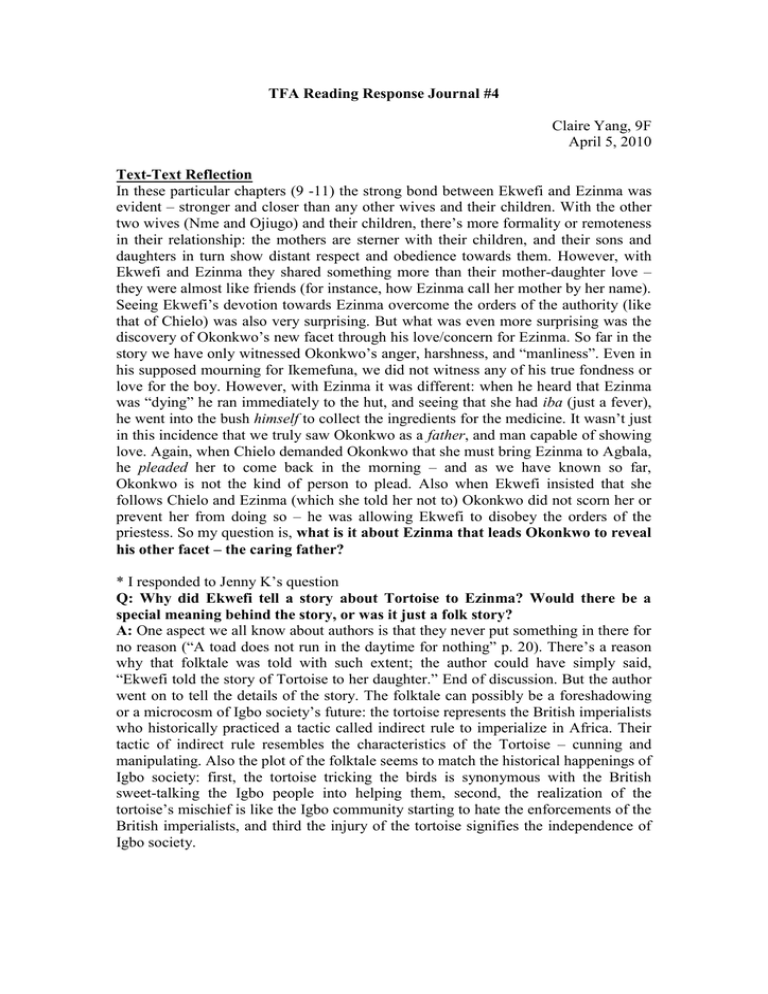
TFA Reading Response Journal #4 Claire Yang, 9F April 5, 2010 Text-Text Reflection In these particular chapters (9 -11) the strong bond between Ekwefi and Ezinma was evident – stronger and closer than any other wives and their children. With the other two wives (Nme and Ojiugo) and their children, there’s more formality or remoteness in their relationship: the mothers are sterner with their children, and their sons and daughters in turn show distant respect and obedience towards them. However, with Ekwefi and Ezinma they shared something more than their mother-daughter love – they were almost like friends (for instance, how Ezinma call her mother by her name). Seeing Ekwefi’s devotion towards Ezinma overcome the orders of the authority (like that of Chielo) was also very surprising. But what was even more surprising was the discovery of Okonkwo’s new facet through his love/concern for Ezinma. So far in the story we have only witnessed Okonkwo’s anger, harshness, and “manliness”. Even in his supposed mourning for Ikemefuna, we did not witness any of his true fondness or love for the boy. However, with Ezinma it was different: when he heard that Ezinma was “dying” he ran immediately to the hut, and seeing that she had iba (just a fever), he went into the bush himself to collect the ingredients for the medicine. It wasn’t just in this incidence that we truly saw Okonkwo as a father, and man capable of showing love. Again, when Chielo demanded Okonkwo that she must bring Ezinma to Agbala, he pleaded her to come back in the morning – and as we have known so far, Okonkwo is not the kind of person to plead. Also when Ekwefi insisted that she follows Chielo and Ezinma (which she told her not to) Okonkwo did not scorn her or prevent her from doing so – he was allowing Ekwefi to disobey the orders of the priestess. So my question is, what is it about Ezinma that leads Okonkwo to reveal his other facet – the caring father? * I responded to Jenny K’s question Q: Why did Ekwefi tell a story about Tortoise to Ezinma? Would there be a special meaning behind the story, or was it just a folk story? A: One aspect we all know about authors is that they never put something in there for no reason (“A toad does not run in the daytime for nothing” p. 20). There’s a reason why that folktale was told with such extent; the author could have simply said, “Ekwefi told the story of Tortoise to her daughter.” End of discussion. But the author went on to tell the details of the story. The folktale can possibly be a foreshadowing or a microcosm of Igbo society’s future: the tortoise represents the British imperialists who historically practiced a tactic called indirect rule to imperialize in Africa. Their tactic of indirect rule resembles the characteristics of the Tortoise – cunning and manipulating. Also the plot of the folktale seems to match the historical happenings of Igbo society: first, the tortoise tricking the birds is synonymous with the British sweet-talking the Igbo people into helping them, second, the realization of the tortoise’s mischief is like the Igbo community starting to hate the enforcements of the British imperialists, and third the injury of the tortoise signifies the independence of Igbo society.
